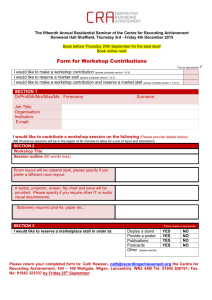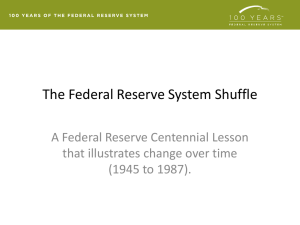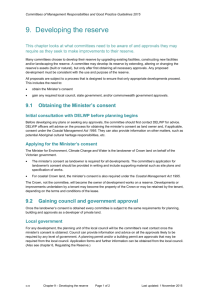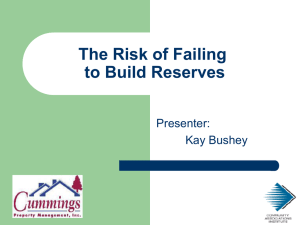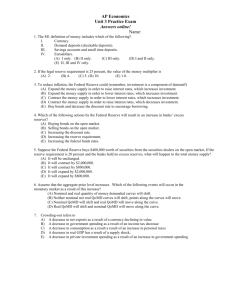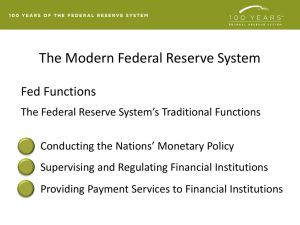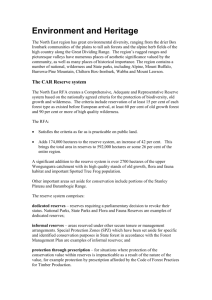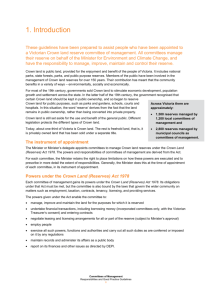Regulating the reserve [MS Word Document
advertisement
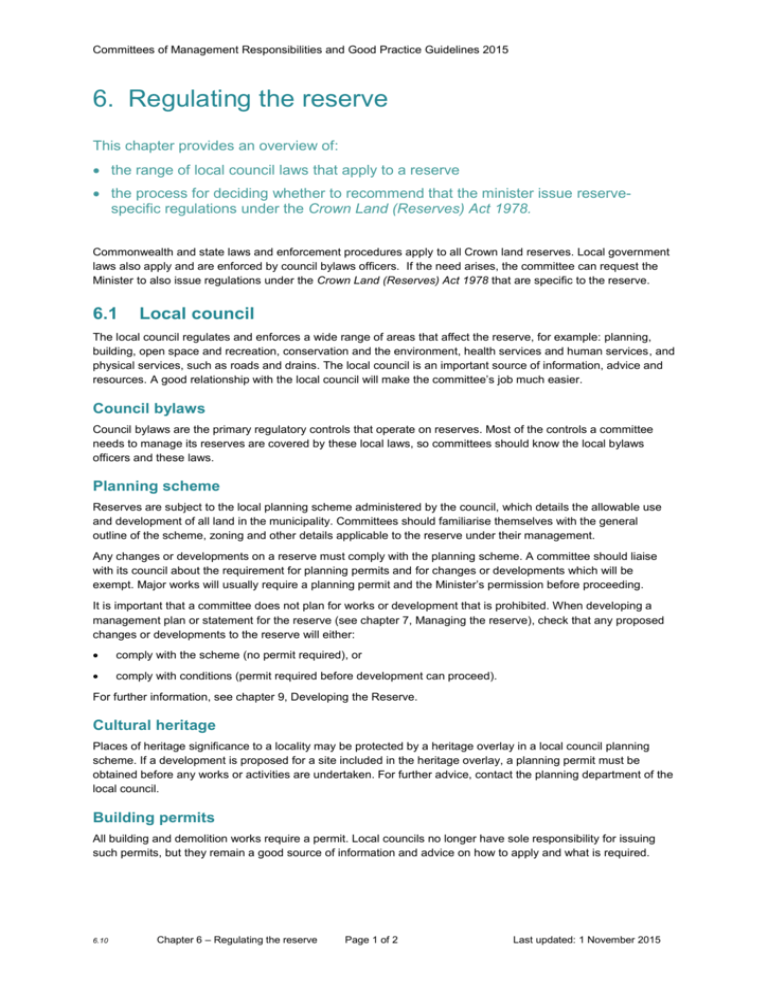
Committees of Management Responsibilities and Good Practice Guidelines 2015 6. Regulating the reserve This chapter provides an overview of: the range of local council laws that apply to a reserve the process for deciding whether to recommend that the minister issue reservespecific regulations under the Crown Land (Reserves) Act 1978. Commonwealth and state laws and enforcement procedures apply to all Crown land reserves. Local government laws also apply and are enforced by council bylaws officers. If the need arises, the committee can request the Minister to also issue regulations under the Crown Land (Reserves) Act 1978 that are specific to the reserve. 6.1 Local council The local council regulates and enforces a wide range of areas that affect the reserve, for example: planning, building, open space and recreation, conservation and the environment, health services and human services, and physical services, such as roads and drains. The local council is an important source of information, advice and resources. A good relationship with the local council will make the committee’s job much easier. Council bylaws Council bylaws are the primary regulatory controls that operate on reserves. Most of the controls a committee needs to manage its reserves are covered by these local laws, so committees should know the local bylaws officers and these laws. Planning scheme Reserves are subject to the local planning scheme administered by the council, which details the allowable use and development of all land in the municipality. Committees should familiarise themselves with the general outline of the scheme, zoning and other details applicable to the reserve under their management. Any changes or developments on a reserve must comply with the planning scheme. A committee should liaise with its council about the requirement for planning permits and for changes or developments which will be exempt. Major works will usually require a planning permit and the Minister’s permission before proceeding. It is important that a committee does not plan for works or development that is prohibited. When developing a management plan or statement for the reserve (see chapter 7, Managing the reserve), check that any proposed changes or developments to the reserve will either: comply with the scheme (no permit required), or comply with conditions (permit required before development can proceed). For further information, see chapter 9, Developing the Reserve. Cultural heritage Places of heritage significance to a locality may be protected by a heritage overlay in a local council planning scheme. If a development is proposed for a site included in the heritage overlay, a planning permit must be obtained before any works or activities are undertaken. For further advice, contact the planning department of the local council. Building permits All building and demolition works require a permit. Local councils no longer have sole responsibility for issuing such permits, but they remain a good source of information and advice on how to apply and what is required. 6.10 Chapter 6 – Regulating the reserve Page 1 of 2 Last updated: 1 November 2015 Committees of Management Responsibilities and Good Practice Guidelines 2015 Open space and recreation Most local councils have an open space strategy to guide their development of formal (e.g. sports grounds) and informal (e.g. wetlands) open space. If a committee is managing an open space reserve, it is a good idea to link with the council’s strategy, with the aim of helping to develop and implement it to the benefit of the reserve. A cooperative approach provides synergies between municipal and Crown land reserves, avoids the possibility of duplication of open space facilities, and may make it easier to access funding for the reserve’s maintenance and development. Conservation and environment Local councils are actively involved in conserving and protecting the environment. The types of activities that councils undertake include protecting land and biodiversity under the planning scheme, and developing and implementing local conservation plans. Many council activities can be of direct benefit to the reserve. Examples may include providing plants for revegetation, developing a wildlife corridor, running recycling programs and developing walking and bicycle path networks. Physical services Councils provide many physical services that support reserves, such as the development and maintenance of roads, footpaths, bike paths, drains, waste management, and parks and gardens. Health and human services The local council’s environmental health officer can provide advice on regulations relating to septic tanks, health standards in food areas, noise standards, pollution standards and pest control. 6.2 Reserve-specific regulations (issued by the Minister) For most committees, the combination of commonwealth, state and local government laws provides all the protection and controls required. However: If existing laws do not cover some activities that a committee needs to control, it can recommend that the Minister make reserve-specific regulations. If the committee wants to charge fees, regulations made by the Minister are required. The Crown Land (Reserves) Act 1978 lists the subject matter that regulations may address. To decide if the committee needs to request reserve-specific regulations: list all activities the committee wants to regulate obtain a set of local laws for the municipality list activities that can be regulated by local laws list activities that cannot be regulated by local laws. The committee should contact DELWP and discuss any reserve-specific regulations that it believes are needed well prior to formally submitting an application (via DELWP) for the Minister to make the regulations. Regulations for a reserve are not enforceable until they have been made and published in the Government Gazette. Committee of management members should not need to enforce regulations due to the availability of Victoria Police, local council bylaws officers and DELWP-authorised officers. If enforcement of regulations is considered necessary, committees of management should not place themselves in dangerous situations. Contact emergency services if there is an actual or imminent threat to the reserve or people on the reserve. When the situation is under control the local DELWP office should be contacted. 6.10 Chapter 6 – Regulating the reserve Page 2 of 2 Last updated: 1 November 2015


